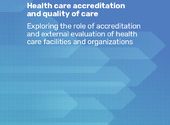Health care has been constantly under fire in recent years due to increasing costs and politicization, much of which has eroded trust in the health care system.
The Frederick News-Post spoke with several Frederick Health employees for a health care roundtable about ongoing trends in the industry in 2020 and what Frederick Health is doing to address them.
This interview has been edited for space and clarity.
What are the major trends you see occurring in the health care field in 2020?
Denise Barton, VP, Business Development & Strategy – Frederick Health
Technology. Hundreds of new health technology products and services are introduced each year. These solutions focus on addressing consumer demands, and are similar to those implemented in other industries like banking and travel. Digital offerings improve access, tackle affordability, ease navigation, offer direct care anytime, streamline transactions, and provide tools to manage an individuals’ health and well-being.
Technology and medical advances in treatment continue to shift care delivery from the hospital to the outpatient and home setting. What once required a several days stay, now knee replacement surgery can be done in a community surgery center, with rehabilitation therapy in an outpatient clinic. Patients who have diabetes can check their blood sugar and results are sent to their provider for real-time monitoring. Palliative and end of life care offer comfort and support at home instead of a hospital or nursing home.
To address the increasing cost of health care, employer and insurers are deploying financial incentives to reduce use of costly health care services. At the same time, mergers across retailers, insurers and providers are creating different delivery systems. For example, United Healthcare acquired Optum, which operates physician practices, urgent care, surgery centers and dialysis services in 12 states. This relationship enables United to offer consumers and employers a lower cost option, and to bypass local health care providers in care delivery. Amazon recently acquired direct to consumer pharmacy, Pill Pak, which has disrupted traditional large pharmacy retailers and intends on expanding their foray into health care.
Governments are experimenting with programs that impact quality and cost, and incorporating them into provider payments and requirements. In Maryland, hospitals are paid based on quality indicators, like preventable visits, and total cost of care for Medicare beneficiaries in their community. The program requires hospitals to manage a patient’s care across the continuum in order to reduce the Medicare dollar spend. To accomplish this goal, hospitals need robust community partnerships with independent doctors, nursing homes, and social service agencies. In addition, hospitals have implemented clinical guidelines, transitions of care programs, and information systems that can capture vital data in one chart and analyze outcomes/cost.
Frederick Health reviews these trends on a continuous basis, and has many initiatives in process. Accessibility has been a key focus, resulting in walk-in and extended hours for primary care and a new contact center that will handle appointments, billing and financial counseling, care navigation and other services. Significant investment has also been made in upgrading our telephone system so that we can monitor calls for quality, customer service and also match staffing with peak call demand. We are currently evaluating other communication options, such as chat and text messaging.
Our recent name change is another response to consumer feedback to more easily recognize our services, but has also resulted in many business process improvements that make things easier for employees. Frederick Health has also added digital tools that improve access and communication among providers and for the public. Examples include a physician on call system, nurse-rounding tool to improve hospital patient experience, and virtual visits for minor health conditions.
Frederick Health has continued to add capacity and options for residents to get care in their neighborhood, with more than a dozen locations across Frederick County. Recently, Frederick Health acquired the former State Farm building to meet the growing needs of our community for years to come. We have aptly named this location Frederick Health Village.
Frederick Health Village will support our population health strategy to provide wellness services and outpatient medical care, enabling us to meet our mission “to positively impact the well-being of every individual in our community.” We will relocate Frederick Health Home Care and Frederick Health Hospice to Frederick Health Village to allow for expansion of home-based services. Future opportunities for this space may include Patient Education, Community Event Services, and Employee Education and Training. We will explore the development of community and wellness-based programs through public and private partnerships.
How, if at all, has the nationwide move to value-based care affected the way you operate? Do you expect to see this trend to continue? What are the benefits and drawbacks you have seen in the shift to value-based care?
Dr. Manny Casiano, Senior VP, Population Health & Ambulatory, Chief Medical Officer – Frederick Health
Since most patient care is delivered outside the walls of the hospital such as in doctors’ offices, clinics, home care, we have become much more focused on what happens outside the hospital. We’re focused on making our community healthier, which can lower the need for hospitalization and emergency care, [which are] two of the most expensive places to receive health care.
We have worked to make sure Frederick has an adequate supply of high-quality physicians and other health care providers. We’re focused on making access to services easier. We emphasize healthy lifestyles and habits, as well as preventive care. We’ve coordinated with our community physicians, specifically through our Frederick Integrated Healthcare Network – which includes 90 percent of our primary care providers in the county, to reduce duplicate or unnecessary tests, and standardize best practice care protocols.
We definitely see this trend continuing. Nationally, health care now consumes almost one-fifth of our entire gross domestic product, and is still growing. That’s simply not sustainable for generations to come. We need to keep people healthy, and support healthier living, while delivering necessary care as efficiently as possible.
In Maryland, and Frederick in particular, the major drawback we’ve seen is that value-based concepts are heavily applied to hospitals, but much less to other parts of the health care system, like physicians, labs, nursing homes, etc. Much of health care is still paid on a piecework basis, which rewards providing treatments to sick people, rather than focusing on preventive care and lifestyle changes to keep people healthy. Therefore, it’s like paddling with one foot each, in two different canoes.
The concept of taking of a holistic approach to health care has come up a lot in recent years. What exactly does that mean, and has Frederick made progress on implementing such a concept? Where does it go in 2020 to build on that progress?
Sara Littleton, Director of Community Health – Frederick Health
The concept of holistic health is not new. According to the American Holistic Health Association, holistic health dates back to ancient times and is more of an approach to life rather than just health. Instead of focusing solely on a specific illness or a particular part of the body the focus is on the whole person. This concept is the core of our community health efforts.
In order for an individual to return to or maintain an optimal level of health and well-being all aspects that affect health outcomes must be considered. That includes access to quality health care; environmental and social factors; genetics; and behavior and lifestyle with the most influential factors being environmental, social, and behavioral and lifestyle. While we can’t impact an individual’s genetics, we can positively impact the other factors affecting their health outcomes and at Frederick Health we are doing this specifically through interventions that relate to outreach, education, and care delivery.
An example of an outreach intervention is our Colorectal Cancer Screening initiative which was developed in 2019 in response to unfavorable colorectal cancer data highlighted in the 2016 Community Health Needs Assessment. The data in this report showed that Frederick County’s rates for colorectal cancer were higher than the State of Maryland and the incidence was on the rise, particularly for African American men. A committee was formed and to date has developed a tool kit, made available to anyone in the community that wants to raise awareness about prevention and early detection. We facilitate events in conjunction with community partners that are held in various locations across the county throughout the year. The focus of these events is on educating the attendees about colorectal cancer screening and prevention as well as providing screening opportunities.
We are educating the community in many ways, both one-on-one and in group settings. One key initiative is the Chronic Disease Self-Management Workshops that are hosted by the health system and taught by our employees as well as community partners. This program is offered at no cost to residents of Frederick County. It is an evidence-based program developed at Stanford University, helping individuals with a chronic condition improve their health. Participants attend a weekly workshop where they learn tools and strategies to deal with pain, fatigue, and stress; identify better nutritional and exercise choices; have more meaningful conversations with their physician and family; and set action plans and problem solve. Additionally, it provides the participants a support network. Workshop topics include chronic disease, diabetes, pain, hypertension (high blood pressure), cancer, fall prevention, and nutrition.
Finally, an example of a unique approach to holistic care delivery is the CARE Clinic, a chronic disease and transition clinic that offers a multidisciplinary team approach to patient care. The team consists of a nurse practitioner, pharmacist, social worker, registered nurse, medical assistant, dietitian, behavioral health specialist, and community health worker. Based on the needs of the patient, any combination of the above team could be involved in the patients’ plan of care—with the patient being at the center. The goal of the team is to provide appropriate medical follow up as well as identify what particular barriers each individual patient has that prevents them from being well. Once identified, the appropriate member(s) work with the patient to remove those barriers such as medication affordability, food insecurity, housing, transportation, insurance coverage, health literacy, etc. This happens by connecting the patient to the necessary resources in the community. The team continues to follow the patient until all of their goals are met.
All three interventions have proven to positively affect not only patient outcomes, but also their quality of life. We are continuously evaluating how to expand our programs and services based on the identified needs of our county residents. In the next year, we will continue to evaluate what barriers prevent out our residents from living their best, healthiest life.
Frederick Health takes a similar holistic approach to patients and families experiencing a cancer diagnosis. We know that providing quality cancer treatment is about more than clinical care. We have a team of dedicated support staff who can make connections to additional resources and support services, including education, support groups, home health, financial counseling, in-home assistance with daily tasks, and complimentary self-care through our Integrative Services.
Integrative Medicine Services Dr. Patrick Mansky, Medical Director, Medical Oncology – Frederick Health Medical Group
Frederick Health embarked on an initiative of creating an optimal healing environment with the design and construction of the James M Stockman Cancer Institute. Spatial design, color selection, and artwork were blended in an effort to create a healing environment for cancer patients, institute staff and family members. We established a dedicated space for Integrative Medicine Services, where complementary medicine practices (with an evidence base for being supportive in the care of cancer patients) are offered. These services include acupuncture, massage, Yoga, mindfulness meditation, and QiGong. In 2019, our Integrative Medicine Services have experienced explosive growth.
In addition to daily patient care sessions and staff education programs, Integrative Medicine Service practitioners have offered workshops and staff retreats. The goal for 2020 is to broaden the reach of Integrative Medicine Services and expand the offering to include art therapies.
How has technology changed health care, and how will it continue to evolve in 2020?
Cheryl Cioffi, DNP, Senior VP, COO/CNO and Jackie Rice, VP, Chief Information Officer – Frederick Health
At Frederick Health, our priority is to provide personalized and patient-focused health care. Advancements in technologies enable us to accomplish this, both within our health care facilities as well as beyond the walls of those facilities. For quite some time, we have utilized numerous technologies to enhance health care. These technologies include telehealth consultations for neonatal cardiology, allowing rapid evaluations by specialists; medications are prescribed electronically, whereby scripts from the doctor are sent directly to the patient’s preferred pharmacy for convenience and to facilitate faster access to the medications while reducing medication errors; EKG results are transmitted from ambulances to the hospital to improve patient outcomes.
During the past two years, we continued our efforts to implement new technologies for our patients, with a focus on innovation. One of the most impactful advancements has been the use of remote patient monitoring. This technology relies on home-based monitoring systems that measure blood pressure, pulse, and weight. The same home-based systems allow for “virtual visits” with a nurse remotely. Our patients appreciate these technological advancements, allowing them to seek health care services from the comfort of their homes. An additional benefit of this technology is that it can decrease the cost of health care, providing a mechanism for early interventions that help patients stay out of the hospital. Historically, the alternative for these patients would have been a visit to our Emergency Room. We continue to see the benefits that this technology provides for our chronically ill patients, with improvements in disease management and patient outcomes.
In the past year, we instituted patient-centered rounding software on tablets, allowing nurse leaders to personally visit with patients to ensure that patient care, environment, and dietary needs are being met through the eyes of the patient. The health care experience of our patients is very important to us, and utilization of this technology provides a direct survey so that we can quickly assess their care and communicate with our care team to address anything that might require further attention. This rounding software also provides tools that allow us to monitor for trends and evaluate patient outcomes. In addition, we are making upgrades to our Nurse Call systems so that patients can talk directly to the nurse and the nurse can receive alerts directly on their mobile device to respond quickly to patient care needs.
Our Patient Portal continues to evolve. Recently we delivered an app for your phone that securely accesses the Patient Portal and allows a patient to see their lab, imaging, and visit information within 24 hours of the test results becoming available. Having the ability to see this information remotely is convenient and it allows the patient to have greater control over their data to decrease errors and improve collaboration with health care providers. Looking forward, soon all Frederick Health entities will utilize a single patient portal, making it easier for patients to view their information.
Frederick Health Medical Group providers have begun utilizing a telemedicine solution, providing patients with convenient access to health care for low acuity conditions like pink eye and cold or flu symptoms, through a Virtual Visit. The provider reviews the patient’s symptoms within a 2-hour window and can prescribe medication or give directions on how the patient should handle the symptoms. Pictures can be uploaded for the provider to view, and the provider can elect to do a face-to-face consultation if they decide that is the best way to proceed. We will continue to expand this technology in the coming year.
Future trends include technology to increase seamless and connected care with your health care providers. Applications for improved health and wellbeing that encourage active participation and monitoring to keep you healthy is already available, but communicating this information to your health care team remains a challenge. Patient data and data-driven analytics will continue to be utilized to improve care and outcomes. The future of health care will include predictive analytics, which will help us to make the best clinical decisions and allow care to be individualized for the patient.
Technology plays an important role in how patients access and interact with Frederick Health’s many services. We also utilize technology to improve patient outcomes, advance clinical treatments, and improve the overall treatment experience for our patients.
Patricia Rice, CRNP, Genetics and Genomics – Frederick Health Medical Group
The field of cancer genetics and genomics continues to evolve at a rapid pace. “Targeted” therapy aimed at interrupting the growth of cancer cells continues to remain at the forefront in the successful treatment of all types of cancer. Frequently referred to as “precision medicine” this the delivery of treatment is based on the genetic markers of an individual’s tumor. Each tumor develops a unique set of gene mutations and markers with an expanding pool of prospective new agents to treat tumors individually and with more precision! We utilize genomic testing to guide treatment for the majority of cancer diagnoses.
Our hereditary cancer and risk assessment program continues to grow at a rapid pace as more and more people are interested in learning about their genetic profile and risk for cancer. We know that identifying individuals at risk, based on their genetics, gives us the power to detect cancer earlier and even prevent cancer in those that are at increased risk. This is a powerful tool in our mission to end cancer!
Frederick Health recently implemented a sophisticated computer software program to identify individuals who are eligible for genetic testing. This technology has been implemented to enhance our mission to accurately identify and offer all individuals genetic testing who are eligible. Genetic testing is becoming more comprehensive, informative, and affordable. It has become an integral part of comprehensive cancer prevention and treatment.
Frederick Health Medical Group provides comprehensive genetic counseling and testing our James M Stockman Cancer Institute and Center for Breast Care locations. Nurse Practitioner Patricia Rice, ANP-BC, OCN, and APNG, is a Board Certified Advanced Practice Nurse in Genetics and leads the program.
5. Is the county prepared to adequately address the heroin/opioid epidemic in 2020? What changes can we expect? Has progress been made?
Addressing the heroin/opioid epidemic in Frederick County is a collaborative effort between many community partners.
Frederick Health works closely with the Frederick County Health Department (the local addiction authority), Mental Health Association, Way Station, Inc., Frederick City Police Department, Frederick County Sheriff’s Department, Frederick County Department of Fire and Rescue, community health care providers, and many others, to address this epidemic.
These community partnerships help to develop and facilitate training and education programs, identification and coordination of support services, and deliver safe, compassionate care and support to those affected by a substance use disorder.
Hospitals are being guided at the State and National level to develop strategies to address the opioid epidemic, including guidelines to standardize opioid medication use and prescribing in emergency departments. Changes include required prior authorization for opioid prescriptions, provider review of the Prescription Drug Monitoring database, limiting the number of opioid pills prescribed, and compliance with the Maryland Emergency Department Opioid Prescribing Guidelines.
Patients identified as at risk (history of substance use disorder, exposure to opioids for legitimate medical needs, etc.) receive a prescription for Naloxone, also known as NARCAN, to reduce their risk of overdose due to intentional or unintentional opioid misuse.
Health care might be the number one issue in determining the 2020 primary election and perhaps the general. Do you anticipate any major changes to the industry as a result of politics and the election?
Tom Kleinhanzl, President & CEO – Frederick Health
There are many health care related policy matters that are currently being discussed and debated at the federal level, including prescription drug pricing, surprise medical billing, emergency drug shortages, provider payment model reform, and health care pricing transparency to name a few.
While approaches to potential legislation to address these issues are being considered federally, the other contemporaneous health care story recently in the news is the uncertainty of the mandate contained in the Affordable Care Act for every individual to carry insurance. While over 15 million Americans have enrolled in ACA exchange plans for 2020, the Fifth Circuit Court of Appeals has recently rendered a decision the individual mandate provision of the ACA is unconstitutional. This decision has been sent back to the lower court to decide whether the rest of the ACA law can remain intact without the mandate.
While it appears nothing immediate will change in the short term concerning insurance coverage as an outcome of this decision, the uncertainty created by the decision has prompted several Democratic-led states to request the Supreme Court consider a challenge to the ruling. It remains to be seen if the Supreme Court will take up the case anytime soon.
In terms of the primary election, there are two main health coverage options being debated; Medicare for All or refinements and expansion to the Affordable Care Act. As appeal for Medicare for All appears to be waning, the focus of some candidates and elected officials is turning towards how to make our existing health care system more affordable.
Fundamentally, health care is a complex and complicated industry. As an outcome, significant reform is difficult without broad based public sentiment to act. With the varied opinions and proposals on the election table and no clear consensus, we see more incremental policy changes, such as attempts to lower prescription drug prices, being pursued rather than a single wholesale broad systemic overhaul to the delivery and payment of health care as an outcome of the coming election.
That said, the focus for Frederick Health will remain on providing the most positive outcomes possible for patients at the lowest cost, and enhancing access to needed services in a growing community. Regardless of the outcome of the Federal election, Frederick Health will continue to work within the framework of Maryland’s all payer reimbursement system to reduce the total cost of health care spending in Frederick County by providing the most appropriate high quality interventions and care at the location that yields the lowest charge to the patient.
The need for transparency and trust in health care providers is at an all-time high. How have you adapted to the calls for transparency and worked to ensure patients trust in the care they’re being provided? How do you expect this trend to continue in 2020?
Dr. Manny Casiano, Senior VP, Population Health & Ambulatory, Chief Medical Officer – Frederick Health
We are constantly reviewing industry-wide best practice care protocols and technology, to make sure we are delivering the highest level of evidence-based care. We constantly look for ways to improve, and strive to be as close to 100% reliable as possible. We carefully review patient outcomes and patient satisfaction feedback to continuously improve what we do.
Frederick Health partners with national organizations to objectively compare our protocols and especially our patients’ outcomes to the best in the nation (both in the hospital and in our clinics), to make sure we are providing world-class care in every service that we offer locally. We have earned recognition from numerous publicly available sources (e.g.: 5 stars in Maryland Hospital Compare, Premier “Top Performer” status, NCQA certification as a top-level Patient Centered Medical Home).
We compare ourselves with the best so that we are constantly improving, and so patients can feel comfortable that they’re receiving the best available care here in Frederick.
Hannah Jacobs, VP, Finance – Frederick Health
In Maryland, a state regulatory agency called the Maryland Health Services Cost Review Commission (HSCRC) regulates the average rate for hospital services (radiology, laboratory, intensive care, etc.) The HSCRC sets average hospital rates effective January 1 and July 1 every year. Frederick Health Hospital posts this information to its website semi-annually, in January and July, to coincide with hospital rate setting.
In addition, Frederick Health is implementing software that will, prior to any scheduled hospital or professional services, upon request provide patients with the estimated cost of their care and their financial responsibility (to include deductibles, copays and coinsurance, if applicable). For those who qualify, Frederick Health offers financial assistance for under or uninsured patients.
Information regarding Frederick Health rates and Financial Assistance Policy can be found at FrederickHealth.org, under “Billing














